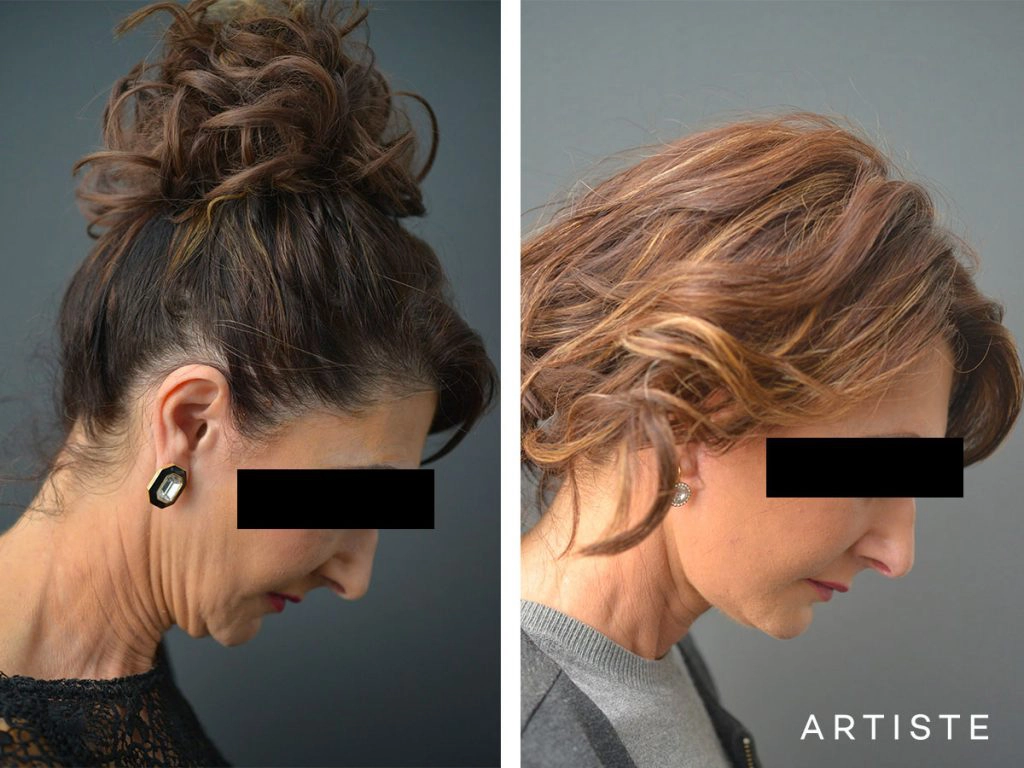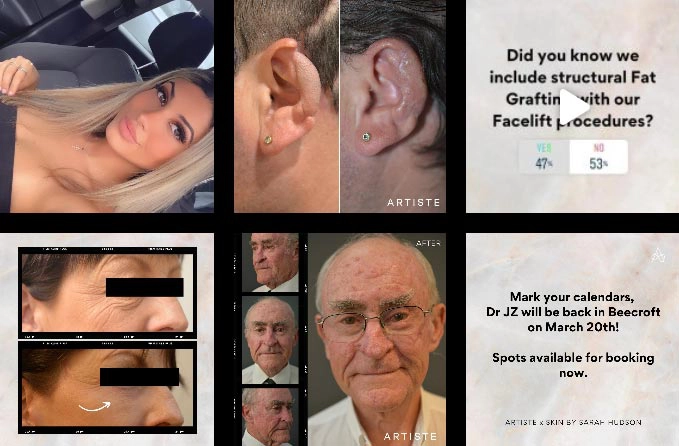What Causes Loose Skin
Model featured in photography

Loose or excess skin on the neck, known by the scientific term “lateral ptosis of the frontal neck derma” is a common phenomenon of ageing, characterised by weakened neck muscles that lose their elasticity.
How Does Loose Skin In The Neck Develop
The platysma muscle is a wide, sheet-like muscle extending from the upper chest and shoulder area, up across the jawline. It’s responsible for expressions like pulling down the mouth corners.
Over time, repeated contraction of this muscle, in combination with a natural loss of skin elasticity due to ageing leads to vertical bands forming on the neck.
The superficial musculo-aponeurotic system (SMAS), or the connective tissue layer that supports the facial structure weakens over time. This phenomenon, alongside changes in fat distribution in the neck area leads to loose skin.
Your Lifestyle
How you live, what kind of life you lead, your dieting habits, and your stress levels all affect your skin. Exposure to UV light is the leading cause of wrinkles.
Staying out in the sun for long hours each day without proper protection will contribute to loose skin and wrinkles later on. Avoid getting wrinkles early by applying sunscreen that blocks UVA and UVB light on your face and neck before going out.
Another factor that contributes to loose skin is smoking. Frequent smoking can cause your blood vessels to narrow.
Since blood vessels carry oxygen, nutrients and vitamins to your skin, if they become too narrow, your skin will suffer from the lack of proper nutrients and start to sag and show wrinkles.
Ageing
The body slows down its production of collagen, hyaluronic acid and elastin as we age, proteins that provide structure and bounce.
Because of this, the skin loses its structure and fullness, resulting in wrinkles, loose skin and changes in texture. While the degradation of these compounds occurs naturally over time, it can be accelerated by air pollution, smoking and other environmental factors.
Genetics
Genetic predisposition is a key intrinsic factor that influences skin ageing, sagging, and wrinkle formation.
Genes affect the skin’s function and structure, including collagen and elastin production, proteins that make the skin elastic and youthful-looking. Inherited variations in these genes can lead to a higher disposition to loose skin.
Some people also have a naturally slower breakdown of the abovementioned proteins, delaying wrinkles and loose skin.
Loss Of Bone Density
While we often focus on collagen and elastin loss for skin laxity, a recent study sheds light on another contributing factor: bone density. “The Relationship between Facial Bone Density and Skin Laxity” by Sam Shuster explores the connection between these two aspects and reveals that a decrease in facial bone density can lead to increased skin laxity.
This finding is relevant to the development of loose skin in the neck. Facial bones, including the jawbone and cheekbones, offer a structural framework supporting the overlying skin.
Bone density naturally weakens as we age, and also contributes to skin sagging in the neck and jawline. With less bone support, the skin loses its youthful tightness, leading to the visible looseness and formation of lines associated.
Loose skin on the neck is a completely normal part of ageing that reflects the natural progress of time. It does not require any change. Some individuals may be curious about their options, it’s important to recognise there is no need for intervention unless it aligns with personal preferences and after careful exhaustion and consideration of all factors.
If you’re looking to understand more about the causes of loose neck skin and the natural ageing process, feel free to consult with Dr. Jack Zoumaras for further information.
Disclaimer: At Artiste Plastic Surgery, our Plastic Surgeons led by Dr Jack Zoumaras have been trained to the highest possible degree. All plastic surgery has risks and it is always advised to get a second opinion. Risks are very real and we cannot guarantee any result. Recovery varies between 1-4 weeks. Results are illustrated as a guide only. All risks are managed and any need for revision surgery or complications (1-5%) can be managed by our specialist plastic surgeons. More information on our website.
Any statements on how you will feel is based on Level V Evidence:
Level V: How you will feel after plastic surgery varies between individuals, depending on psychological and physical factors. Our internal research is based on how patients in our practice feel after surgery.
The blogs are not a substitute for a medical consultation and do not form as part of the doctor to patient relationship.
SHARE THIS ARTICLE
Jul01
Facelift Recovery Tips: What Speeds Up Healing and What to Avoid
Disclaimer: At Artiste Plastic Surgery, our Plastic Surgeons led by Dr Jack Zoumaras have been trained to the highest possible degree. All surgery has risks and it is always advised ...
Jul01
How to Prepare for Facelift Surgery: What to Do Before Your Big Day
Disclaimer: At Artiste Plastic Surgery, our Plastic Surgeons led by Dr Jack Zoumaras have been trained to the highest possible degree. All surgery has risks and it is always advised ...
ABOUT ARTISTE
Artiste Plastic Surgery is an Award Winning Specialist Plastic Surgery practice led by internationally trained Dr. Jack Zoumaras, Plastic Surgeon and Peer Reviewed Face Surgeon
Artiste offers the latest Cosmetic Surgical Procedures of the Face, Breast and Body, inspired from leading centres around the world.
STAY IN THE LOOP
Enter your email address below to receive updates on new articles and VIP access to promotions and special offers.
FOLLOW US ON INSTAGRAM










